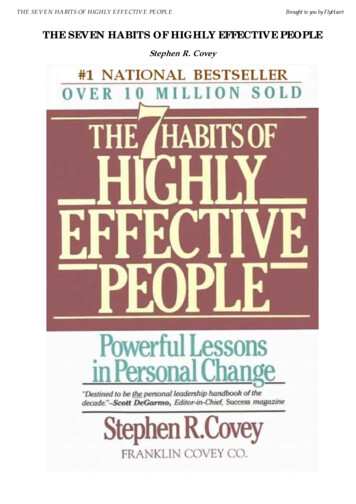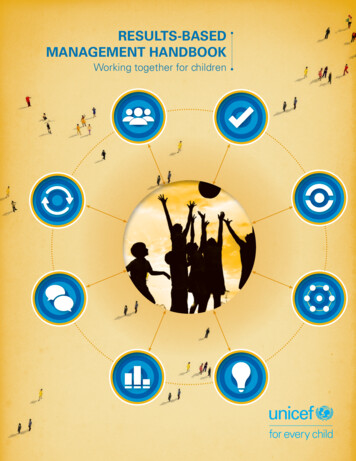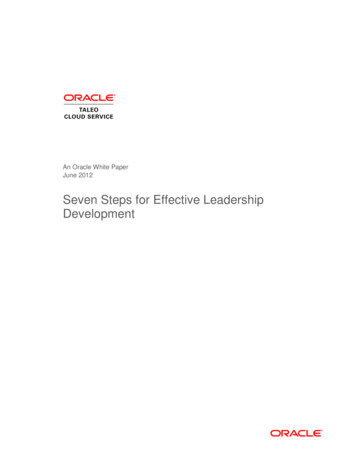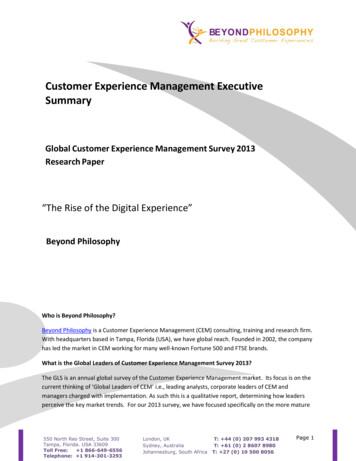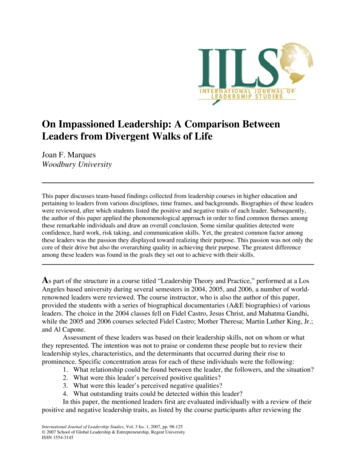
Transcription
How effectiveleaders getresults7 ways to bemore proactiveBy Jennifer ColosimoSenior Vice President, FranklinCovey
How effective leaders get results: 7 ways to be more proactive FranklinCoveyLEARN MORELeadership often means doing stuff noone else wants to. Broaching touchy topics.Making unpopular decisions. Acceptingresponsibility. Charting a clear path in a hazeof uncertainty. Questioning the status quo.These aren’t exactly easy (or glamorous)undertakings — especially if you’rerelatively new to leadership andaccustomed to letting others takecharge. But the good news is you don’thave to dramatically overhaul yourbehavior to take more initiative. Youjust need to make a few small, doabletweaks to your regular planning andcommunication habits. This guide willhelp you make changes, whether youare leading collocated teams, remoteemployees, or a mix of both. Franklin Covey Co. All rights reserved.2
How effective leaders get results: 7 ways to be more proactive FranklinCoveyLEARN MORE“ Are the 7 Habits as relevanttoday as they were whenthey were first created?Absolutely, they aremore relevant than everbefore. The greater thechange, the more difficultthe challenges, the morerelevant the 7 Habitsbecome. Why? Because theyare based on principles ofeffectiveness that endure.”— Stephen R. Covey Franklin Covey Co. All rights reserved.3
How effective leaders get results: 7 ways to be more proactive FranklinCovey1. Most leadersare asked to domore than ishumanly possible.“ The main thing is tokeep the main thingthe main thing.”LEARN MOREIf you pretend you can handle anything and everythingthat comes your way, you could end up not only burningout, but also failing at your job.To tell if you might be falling into this common trap,ask yourself:How do you start your days? Do you sit down at yourdesk and simply react to whatever seems most urgent?Every role requires a certain amount of this — for example,maybe your team is responsible for resolving customercomplaints as they crop up. But you can’t afford toconsistently get so bogged down in the crisis du jour thatyou lose sight of bigger, more important parts of your job,like ensuring your team is working toward key goals, ordiving into a longer-term, high-profile project early so youhave enough time to do quality work. To keep your priorities straight, set aside a fewminutes at the end of each workday to make a listof your 3–5 most important tasks for the next day.— Stephen R. Covey Franklin Covey Co. All rights reserved.4
How effective leaders get results: 7 ways to be more proactive FranklinCoveyLEARN MORE ou have to decideYwhat your highestpriorities are andhave the courageto say no to otherthings.— Stephen R. Covey Franklin Covey Co. All rights reserved.5
How effective leaders get results: 7 ways to be more proactive FranklinCovey2. Clearly andexplicitlycommunicateyour expectations.LEARN MOREThink your team knows exactly what you expect of them?Unless you’ve talked about your performance standardshead-on with each of your direct reports — and done soeffectively — don’t be too sure. They aren’t mind readers.Admittedly, it can be nerve-racking to level with yourteam about standards they may fall short of or that earnyou the label “tough.” But excellence rarely happens outof the blue. If people are going to achieve it, they need toknow what it looks like — and what it doesn’t look like.“ Accountability breedsresponse-ability.”— Stephen R. CoveyIf your mind goes blank, or your definitions are tooabstract to be meaningful, you have some work to do.How’s your team supposed to have a firm grasp ofyour expectations if you don’t?With this in mind, take some time to capture, in writing,how you define great performance for the different roleson your team. Shoot for accuracy and specificity.Instead of just “reliable,” try:“Meets or beats deadlines at least 80 percent of the time.”or:“Completes work at such a high level, it requires an houror less of a senior team member’s time to review.” Franklin Covey Co. All rights reserved.6
How effective leaders get results: 7 ways to be more proactive FranklinCoveyLEARN MOREDon’t assume yourexpectations areapparent in youractions. Communicatethem clearly andexplicitly. Franklin Covey Co. All rights reserved.7
How effective leaders get results: 7 ways to be more proactive FranklinCovey3. Follow thesesteps to becomea feedback pro.LEARN MOREEver find yourself on either the giving or receiving end of asurprising feedback revelation? A stellar direct report thinks youdon’t like her work, for instance, or your manager rarely reads youremails because they’re so long?If so, you’ve learned that feedback is too important to letcircumstances alone dictate when or if it’s shared. Youand your team need regular feedback to know where youstand with each other and what areas need work.A culture of feedbackis built on trust. Pay closer attention to less obvious forms offeedback such as body language, in meetings oron video conferences. Feedback is all around you,all the time. If your manager shrugs and avoids eyecontact, maybe you should ask a follow-up questionto learn more about what’s not being said. If yourteam chronically checks their phones during meetings,maybe you’re focusing on the wrong issues orunnecessarily hijacking people’s time. And if a peermanager reaches out to you for advice, maybe you’remore respected and appreciated than you realize. Consciously provide and collect feedback byexplicitly scheduling it into your routine. You canstart by setting a quota for the number of times yougive feedback to each person on your team. Onceyou have that down, you could create weekly, monthly,or quarterly reminders in your calendar to focus onfeedback in other ways.A good feedback culture is built on trust, so if you don’talready have a strong foundation of trust with your teammembers, boss, and peers, you’ll need to build one.Once you’ve established trust, here are three basic stepsyou can take to become a feedback specialist: Shift your mindset to focus on the main purpose offeedback: to learn. It’s common to get hung up onthe challenging aspects of feedback — the discomfortof telling someone they’re underperforming, forexample, or the sting of discovering you’re not viewedas favorably as you imagined. But the short-term painis almost always worth the opportunity to grow — or,at the very least, enhance your understanding ofsomeone else’s perspective. Franklin Covey Co. All rights reserved.8
How effective leaders get results: 7 ways to be more proactive FranklinCoveyLEARN MORE“ One of the greatestgifts you can giveanother humanbeing is constructivefeedback on a blindspot they neverknew they had.”— Stephen R. Covey Franklin Covey Co. All rights reserved.9
How effective leaders get results: 7 ways to be more proactive FranklinCovey4. Schedule a regularphone or video chatwith team memberswho work remotely.Encourage remoteteam members to pairup for virtual chats.LEARN MOREIf you have team members who don’t work in the sameoffice as you, it’s easy to assume “no news is good news”and passively let days slip by without much, if any, contact.Many have found themselves working remotely when itdidn’t use to be the norm. Remote workers are sometimesmore productive because they aren’t getting distractedby random conversations with co-workers. But the lackof regular communication can take an emotional toll andleave them feeling out of the loop.Choose video or phone chats over emailing or instantmessaging. That way, it’s easier to read your remoteteam members’ expressions and moods. It may also helpto clearly convey why you’re checking in — not to be amicromanager, but because you want to make surethey’re heard, supported, and informed.You don’t want to wake up one day and realize thatyour genius developer in New Zealand or your go-gettersalesperson in New Delhi is too dispirited and disengagedto be much of a genius or a go-getter.For example:While it might seem overly formal, blocking out arecurring time, maybe daily or a few times a week, tocheck in with remote team members can help you staybetter attuned to their unique challenges and needs — andif they work from home or out of a solo office, reducetheir sense of isolation. It also provides an opportunity tokeep them informed. You don’t want to fall into the trapof passing along news to direct reports who are in closeproximity, while neglecting those who aren’t. irembe, I was thinking it might be helpful forMus to schedule a video chat — maybe at 4 o’clockyour time, every Tuesday and Thursday. I want tomake sure I’m regularly getting your input andbenefiting from your expertise. Plus, it will helpme stay in touch with how you’re doing so I canprovide support if you need it. Would you be upfor trying this? Franklin Covey Co. All rights reserved.10
How effective leaders get results: 7 ways to be more proactive FranklinCoveyLEARN MORE“ Whenever someonewaits for someoneelse to provide asolution, I tell them‘Use your R and I’(resourcefulnessand initiative).”— Stephen R. Covey Franklin Covey Co. All rights reserved.11
How effective leaders get results: 7 ways to be more proactive FranklinCovey5. When you’re tornover whether toinitiate a difficultconversation, do it.LEARN MOREA historically strong performer on your team suddenly startsslacking off, and you’re hoping it’s just a temporary blip. Your teamis in danger of missing the ship date for a product upgrade, butyou’d rather not bring it up with your manager because she’sbeen under a lot of stress lately.A peer with a lot of clout keeps co-opting your team’stime without asking you, but you don’t want to get onhis bad side.Effective leaderssee differences asa catalyst to builddynamic teams thatbring about change.In situations like these, you’re faced with a choice: saysomething, or let it slide. And while your decision willdepend on your specific circumstances — the peopleinvolved, your organization’s culture, your managementstyle, and countless other factors — many managers, moreoften than not, opt to let it slide. Why? Because sayingnothing seems safer. Easier. Faster.The key word is seems. That high performer who’sslacking off could be looking for another job — and byfailing to address the issue triggering the job search,you could increase your risk of losing the person.By not alerting your manager to the possibility ofmissing the product ship date, you could make it harderfor her to come up with a customer-communication plan,ultimately adding even more to her stress. And letting apeer manager continue to co-opt your team’s time couldundermine the team’s ability to meet goals over time,eventually hurting your reputation more than irritatingthe powerful peer. o when in doubt, sit down, or schedule a callSwith the other person or people involved andtalk about what’s really going on. You don’t haveto say it perfectly. Simply saying it — and thenlistening — is enough. Franklin Covey Co. All rights reserved.12
How effective leaders get results: 7 ways to be more proactive FranklinCoveyLEARN MORE“ What you do has fargreater impact thanwhat you say.”— Stephen R. Covey Franklin Covey Co. All rights reserved.13
How effective leaders get results: 7 ways to be more proactive FranklinCovey6. Create customizedretention plans todevelop and engagetop talent.LEARN MOREYou’re bound to lose good people from time to timethrough no fault of your own. But it’s a lot easier toaccept if you’ve done everything in your power tokeep it from happening.That means consciously taking steps to guard againstunwanted turnover instead of just crossing your fingersand hoping the superstars of your team — and the quietlyconsistent stalwarts, who are easier to forget about butsometimes just as painful to lose — remain happy.Don’t just think aboutthe strongest, flashiestperformers but alsoteam members whoare quietly consistent.Compensation is certainly a factor, but things like holdingregular 1-on-1s, getting to know your team membersas people, consistently giving both reinforcing andredirecting feedback, and exploring career-developmentideas together can have a bigger impact.So, what does an effective retention plan look like? Well,it depends on whom you’re trying to retain and whatmakes them tick. Here’s what Gallup found throughconducting employee-engagement surveys for decades:“Contrary to what many managers might think, most oftheir employees who voluntarily leave the company aren’tdoing so for better pay or benefits.” Franklin Covey Co. All rights reserved.14
How effective leaders get results: 7 ways to be more proactive FranklinCoveyLEARN MORE“ Leadership happensone conversation ata time. So be mindfulwith each one.”— Todd Davis,Bestselling Author, Get Better Franklin Covey Co. All rights reserved.15
How effective leaders get results: 7 ways to be more proactive FranklinCovey7. Set a quarterlylearning goal foryourself andshare it withyour manager.LEARN MORE“If you’re not learning, you’re dooming yourself to keepworking the same way you do today — which almostcertainly means you’ll fall behind when the world changesaround you.”Unless you want to risk becoming obsolete, redundant,or mired in the status quo — a doubly dangerous mindsetfor a manager, given how it can stifle the rest of yourteam — don’t get too comfortable with your level ofcompetence and expertise.While it’s hard to find time for outside reading aboutthe market you serve, coaching sessions on yourleadership skills, or an online course on a key developmentin your field, it’s a lot harder — and more painful — to getcaught unprepared.“ We become whatwe repeatedly do.”— Stephen R. Covey Franklin Covey Co. All rights reserved.16
How effective leaders get results: 7 ways to be more proactive FranklinCoveyLEARN MOREYour organization’s success dependson strong individual performance.Stephen R. Covey’s book The 7 Habits of HighlyEffective People has empowered and inspiredreaders for 30 years. It continues to be a bestsellerfor the simple reason that it ignores trends and poppsychology and focuses on timeless principles ofempathy, collaboration, self-management, problemsolving, and communication.No matter how competent your people are, they won’t generatesustained and lasting results unless they’re able to effectivelylead themselves; influence, engage, and collaborate with others;and continually improve and renew their capabilities.Renowned as the world’s premier personal leadershipdevelopment solution, The 7 Habits of Highly EffectivePeople aligns enduring principles of effectiveness withtoday’s technology and practices. By making theseprinciples part of your organization’s shared culture,you can propel all of your employees toward theirvery best performance.To get started, email us at info@franklincovey.com,or visit franklincovey.com.Or call us at:1-888-868-1776 Franklin Covey Co. All rights reserved.17
Franklin Covey Co. All rights reserved.MRK2055551 Version 1.0.3Learn more at franklincovey.com
This guide will help you make changes, whether you are leading collocated teams, remote . style, and countless other factors — many managers, more often than not, opt to let it slide. Why? Because saying . 7 ways t
